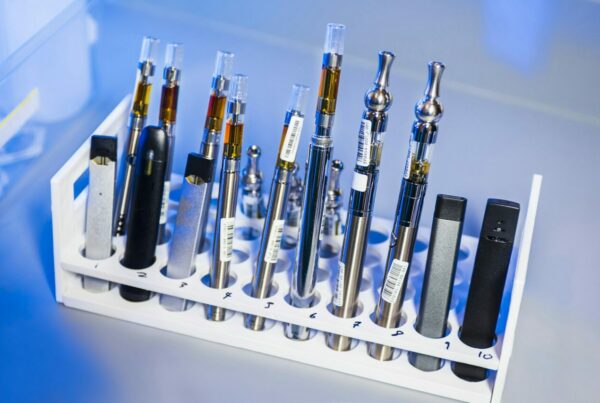N, N-Dimethyltryptamine, commonly known as DMT, is a compound typically found in both flora and fauna and is known for its potent, yet fleeting, psychedelic effects when ingested.
Emerging evidence suggests that DMT, which naturally occurs within the body, plays crucial roles in both peripheral and central nervous systems, potentially operating as a neurotransmitter.
Although DMT can produce strong psychedelic effects, it generally doesn’t result in many negative effects. However, potential cardiovascular problems may occur when large doses are administered via injection.
Let’s explore DMT further and its multifaceted roles, ranging from recreational use to its intriguing potential in scientific research and therapeutic applications.

DMT at a Glance: What is it?
| Aspect | Details |
| Name | N, N-Dimethyltryptamine (DMT) |
| Classification | Indole alkaloid |
| Occurrence | Found naturally in a variety of plants and animals |
| Psychoactive Effects | Produces brief, intense psychedelic experiences upon consumption. |
| Method of Consumption | Can be smoked, injected, or ingested orally. |
| Duration of Effects | Effects are short-lived, typically lasting between 5 to 30 minutes. |
| Chemical Structure | Composed of a tryptamine core with two methyl groups attached to the amine nitrogen atom. |
| Metabolism | Rapidly metabolized by the body, broken down by monoamine oxidase (MAO). |
| Cultural Use | Historically used in various ceremonial and shamanic rituals by indigenous cultures. |
| Other names | Dimitrifantasia, Businessman’s trip, Businessman’s special, 45-minute psychosis, Spiritual molecule |
DMT’s Role in Mental Health
N, N-Dimethyltryptamine (DMT), a compound famous for its powerful psychedelic effects, is gaining attention due to its potential benefits to mental health. Although traditionally known for inducing intense visionary experiences, recent research suggests a connection between DMT and mental well-being.
Effects on Psychological and Emotional Well-being
DMT is known to create profound psychedelic effects that can trigger deep emotional reactions and alter states of consciousness. This might offer new therapeutic avenues to address mental health issues, aid in emotional processing, and offer fresh perspectives on personal traumas.
Neuroplasticity and Brain Function
Research suggests that DMT could influence neuroplasticity, thereby enhancing the brain’s ability to adapt and restructure. Investigating its impact on synaptic plasticity and neural connectivity might offer potential remedies for conditions associated with neural imbalance.
Potential Therapeutic Application for Mental Health Disorders
Early studies underline the potential of DMT to treat disorders such as depression, addiction, and PTSD. Its ability to initiate mystical or spiritual experiences could provide a novel approach to psychotherapy and aid in modifying negative thought patterns.
Exploring the natural occurrence of DMT in the body underscores its significance in mental health resilience, stress response, and overall psychological well-being. Understanding how the body controls internal DMT levels could lay the groundwork for new therapeutic strategies.
DMT and Mental Health Disorders
| Mental Health Disorder | Description | Effectiveness of DMT | Benefits |
| Depression | A mood disorder marked by persistent sadness, disinterest, and decreased motivation | Preliminary studies suggest DMT may help reduce symptoms by eliciting deeply emotional experiences. | Its rapid onset and ability to provoke transformative experiences could offer innovative therapeutic techniques for reframing negative thought patterns and enhancing emotional processing |
| Post-Traumatic Stress Disorder (PTSD) | A mental health disorder resulting from traumatic incidents leading to flashbacks, intense anxiety, and intrusive thoughts | Early research points to DMT’s potential to manage symptoms by instigating spiritual or mystical experiences that could help patients reframe traumatic memories | The potential of DMT to trigger altered states of consciousness may help facilitate emotional processing and offer a fresh perspective on traumatic experiences |
| Addiction | A complex disorder characterized by compulsive engagement in rewarding stimuli despite adverse consequences | Some research suggests a role for DMT in interrupting addictive patterns and reducing cravings for substances | The capacity of DMT to provoke powerful and transformative experiences could assist individuals in modifying their behavioural patterns and addressing underlying reasons for their addiction |
Procedure of Utilization for DMT
DMT, recognized for its ability to trigger short yet powerful psychedelic experiences, can be administered in a variety of ways. The chosen method often depends on the desired strength and length of the psychedelic journey.
Inhalation:
When DMT is smoked using a pipe or vaporizer, careful heat management is required to avert the overheating and burning of the compound. Upon smoking DMT, the onset of a psychedelic journey is nearly instantaneous, generally lasting between 5 to 15 minutes.
Oral Consumption:
Orally consuming DMT results in slower but longer-lasting effects, often extending to several hours. This is because DMT breaks down slower when combined with an MAOI.
Injection:
DMT can be inserted directly into the bloodstream to produce quick and powerful effects.
This method yields an immediate and powerful experience, but it necessitates precise dosage measurement and involves greater risks.
Insufflation (Snorting):
Snorting DMT results in a slower onset of effects compared to inhalation, but it may provide a more prolonged experience.
Sublingual or Buccal Administration:
When absorbed through the oral mucosa, this method presents an alternative to inhalation and yields a longer, albeit less intense, experience.
Determining Therapeutic Dosage for N, N-Dimethyltryptamine (DMT)
For inhalation, the suggested dosage lies between 20 to 40 mg, while for intravenous application, the recommended dosage is 0.2 to 0.4 mg per kg of body weight. These dosage guidelines are primarily designed for clinical research, especially for intravenous application.
- Higher doses administered intravenously are associated with intense visuals, temporary loss of control, and a combined state of anxiety and euphoria
- Interestingly, lower doses have demonstrated less favourable effects
- Recreational doses of inhaled DMT generally vary from 40 to 50 mg, sometimes even reaching up to 100 mg
- Different doses of intravenous People have reported enduring enhancements in psychological health following near-death experiences linked with DMT (7, 14, 18, and 20 mg solutions).
Where Can You Find DMT?
Osmosis – 4-ACO-DMT Ethereal Essence Tincture
This tincture, which is said to contain 4-Acetoxy-N, N-dimethyltryptamine (4-AcO-DMT), a form of DMT, is designed for oral consumption. This DMT variant could potentially offer a unique experience compared to standard DMT.
Lucid Supply Co. – 5-MeO DMT Vaporizer
This product is a vaporizer filled with 5-Methoxy-N, N-dimethyltryptamine (5-MeO-DMT). This compound is known for its powerful, transformative, and often short-lived experiences.
Integral Alchemist – Acacia – 1ml DMT Vape Cartridge
The Integral Alchemist’s DMT vape cartridge is pre-filled with N, N-Dimethyltryptamine. This product is likely intended for those who prefer a discreet and convenient way to consume DMT.
Deadhead Chemist – 5-Meo-DMT Cartridge
This cartridge holds 5-Methoxy-N, N-dimethyltryptamine (5-MeO-DMT), a compound known for its deep and powerful effects.
The potential mental health benefits may be connected to personal growth, spiritual experiences, or therapeutic uses aimed at enhancing emotional well-being.
Deadhead Chemist – N, N DMT Cartridge
Another offering from Deadhead Chemist, this cartridge is filled with the classic N, N-Dimethyltryptamine. These cartridges provide a simple and straightforward way to consume DMT, allowing for a more consistent and controlled experience.
Concluding Remarks
The consumption of N, N-Dimethyltryptamine (DMT) in
How can DMT be used safely and responsibly?
DMT use should always be thoughtfully considered, taking into account individual mental health needs and the potential impact of the experience.
It’s crucial to obtain DMT from reliable sources like the Magic Mushrooms Montreal Canada Online Dispensary, which can provide guidance and a variety of product options for a responsible exploration of DMT.
Mental health therapy is a fascinating and complex journey. The ability of certain compounds to induce powerful, yet brief, psychedelic experiences opens the door to innovative therapeutic approaches.
Preliminary studies hint at its potential in emotional processing, personal development, and possibly
The profound influence of mental health treatment necessitates careful consideration and responsible usage.
Frequently Asked Questions:
How do different DMT products affect mental health?
For instance, vaporizers may yield immediate effects, while tinctures or vape cartridges can offer more controllable and consistent dosages.
Introducing derivative compounds or 5-MeO-DMT can result in varying degrees of intensity and different types of mental health effects.
These nuanced differences underscore the importance of selecting a DMT product based on individual preferences and mental health goals.
Can DMT facilitate enduring changes in mental health and personal growth?
There are anecdotal accounts indicating that DMT-induced experiences could have long-term effects on mental health and personal evolution.
Highly impactful or life-altering experiences, such as near-death-like events, are frequently associated with reports of sustained positive changes in psychological wellbeing and personal development.
Although these experiences are intense and transient, they often spur self-contemplation, spiritual revelations, and a sense of unity or enlightenment.
Users frequently report a refreshed perspective on life, enhanced emotional resilience, and a deepened appreciation for existence following these experiences.
What’s the optimal strategy for employing DMT for mental health purposes?
It’s essential to make informed decisions, which involve thorough research and comprehension of the compound’s effects.
Advice from mental health professionals or experienced users can provide valuable perspectives on potential dangers and benefits.
Assessing personal tolerance and mental preparedness is equally important, as well as ensuring a supportive and safe environment for the experience.
How is DMT different from other psychedelic treatments such as psilocybin or LSD in mental health therapy?
DMT varies from other psychedelics like psilocybin or LSD in terms of effects, duration, and intensity. It has a notably shorter duration.
High-intensity, short-acting psychedelics like DMT require unique therapeutic methods in mental health, separate from those implemented for longer-lasting psychedelics.
Recommended Additional Reading:





